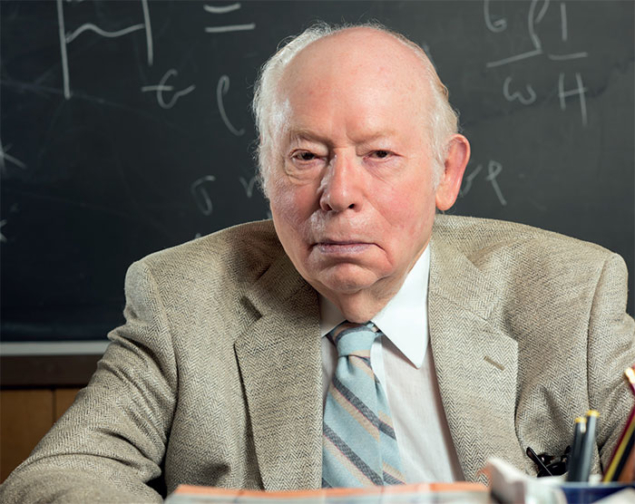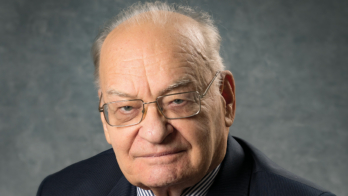
Steven Weinberg’s continuous leadership in particle physics, gravity and cosmology, has been recognised by a Special Breakthrough Prize in Fundamental Physics. While his contribution to the genesis of the Standard Model has undoubtedly been Weinberg’s greatest single achievement, states the selection committee for the $3M prize, he would be recognised as a leader in the field even if he had not made this particular contribution. “Steven Weinberg has developed many of the key theoretical tools that we use for the description of nature at a fundamental level,” said Juan Maldacena of the Institute for Advance Study in Princeton, chair of the selection committee.
Weinberg’s 1967 paper “A Model of Leptons” determined the direction of high-energy particle physics through the final decades of the 20th century and is one of the most cited in theoretical physics. The paper applied the notion of spontaneous symmetry breaking to the weak interaction, revealing that it is unified with the electromagnetic interaction and predicting the existence of the W, Z and Higgs bosons – all of which went on to be discovered at CERN. Weinberg also used spontaneous symmetry breaking to account for the masses of elementary fermions, which the LHC experiments are now probing. The electroweak theory won Weinberg, Abdus Salam and Sheldon Lee Glashow the 1979 Nobel Prize in Physics.
There was a special pleasure in being awarded the prize, because the selection committee is composed of a younger generation
Steven Weinberg
“Of course, nothing compares with the Nobel Prize in prestige, if only because of the long history of great scientists to whom it has been awarded in the past,” says Weinberg, when asked to compare the two awards, “but for me there was a special pleasure in being awarded the Breakthrough Prize, because the selection committee is composed of a younger generation of outstanding physicists who are today playing a leading role in research.”
The prize committee also cites Weinberg’s achievements in communicating science. His teaching and “meticulously written textbooks” have had a major influence on succeeding generations, they say, while also acknowledging Weinberg’s highly visible public role as a spokesman for science and rationality.
Weinberg is currently the Jack S Josey – Welch Foundation Chair in Science at the University of Texas at Austin.
Breakthrough Prize for Eöt-Wash group
On the same day, September 10th, the 2021 Breakthrough Prize in Fundamental Physics was announced. Also worth $3M, it is shared between Eric Adelberger, Jens H Gundlach and Blayne Heckel, the leaders of the Eöt-Wash group at the University of Washington, “for precision fundamental measurements that test our understanding of gravity, probe the nature of dark energy and establish limits on couplings to dark matter”. The trio have built equipment sensitive enough to measure the force of gravity on unprecedentedly low scales to test the inverse square law, with results earlier this year showing that the law holds true down to distances of 52mm.
Three New Horizons in Physics Prizes, each worth $100,000 and designed to recognise early-career researchers, were awarded to: Tracy Slatyer (MIT) “for major contributions to particle astrophysics, from models of dark matter to the discovery of the ‘Fermi Bubbles'”; Rouven Essig (Stony Brook University), Javier Tiffenberg (Fermilab), Tomer Volansky (Tel Aviv University) and Tien-Tien Yu (University of Oregon) “for advances in the detection of sub-GeV dark matter especially in regards to the SENSEI experiment”; and Ahmed Almheiri (IAS), Netta Engelhardt (MIT), Henry Maxfield (UC Santa Barbara) and Geoff Penington (UC Berkeley) “for calculating the quantum information content of a black hole and its radiation”.
The Breakthrough Prize in Fundamental Physics, which has taken place annually for the past nine years, was created “to recognize those individuals who have made profound contributions to human knowledge”, while the Special Breakthrough Prize in Fundamental Physics has only been handed out on six occasions and is not limited to recent discoveries. Last year, theorists Sergio Ferrara, Dan Freedman and Peter van Nieuwenhuizen received a Special Breakthrough Prize for their 1976 invention of supergravity. Other past winners include Steven Hawking (2013); the LIGO collaboration (2016); and seven CERN scientists (2013) for the discovery of the Higgs boson. The 2021 prize ceremony is due to take place in March.





